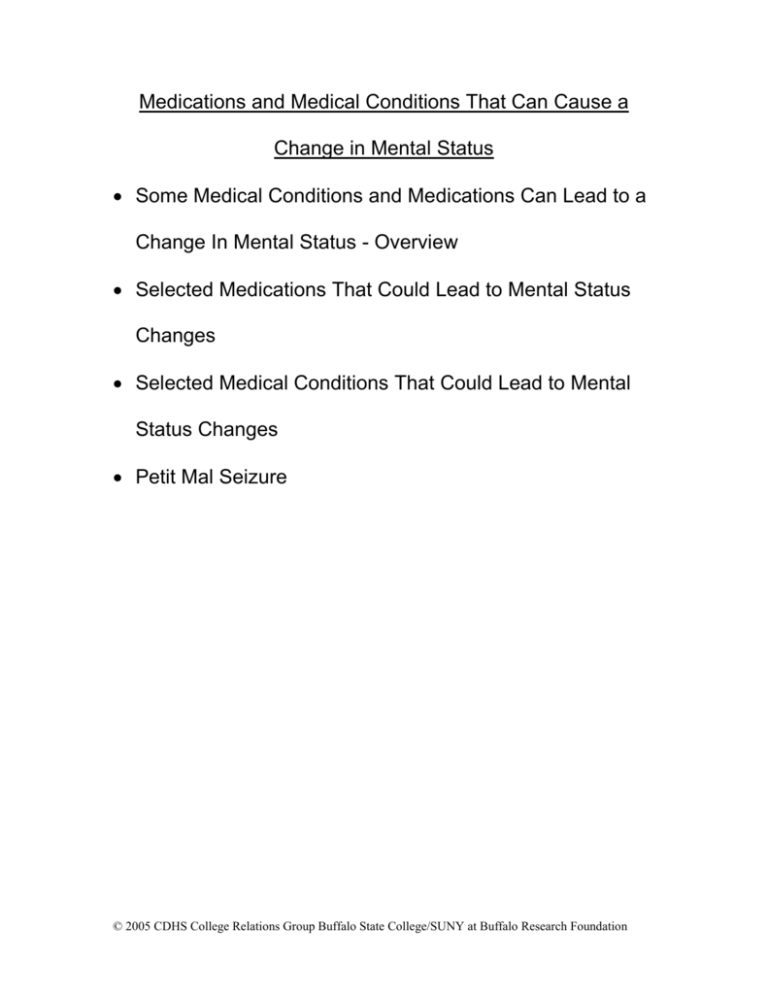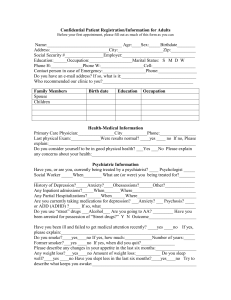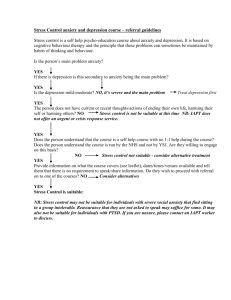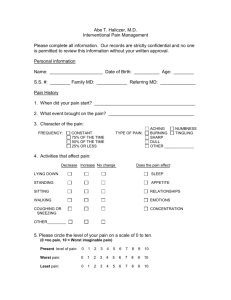Medications and Medical Conditions That Can Cause a Change in
advertisement

Medications and Medical Conditions That Can Cause a Change in Mental Status Some Medical Conditions and Medications Can Lead to a Change In Mental Status - Overview Selected Medications That Could Lead to Mental Status Changes Selected Medical Conditions That Could Lead to Mental Status Changes Petit Mal Seizure © 2005 CDHS College Relations Group Buffalo State College/SUNY at Buffalo Research Foundation Some medical conditions and medications can lead to a change in mental status This could cause non-adherence to the plan developed by the CPS caseworker Sometimes people may not know they have a health condition Older adults can be more susceptible to mental status changes caused by medications or by a medical condition such as dehydration or an infection (like pneumonia or a urinary tract infection) Any medical condition that involves decreased oxygen delivery to the brain can appear as drunken behavior Certain medications, such as steroids, can lead to mental status changes as can withdrawal from some drugs (medications and drugs of abuse) and from alcohol Vitamin deficiencies can cause mental status changes (In the U.S., where we have lots of food, vitamin deficiencies are often but not always seen in people who don’t eat well, for instance alcoholics) Toxins like lead and other heavy metals, pesticides, solvents, carbon monoxide, drugs of abuse and medications can cause mental status changes © 2005 CDHS College Relations Group Buffalo State College/SUNY at Buffalo Research Foundation Selected medications that could lead to mental status changes Medication Atarax/Vistaril (hydroxyzine) L-Dopa and Sinemet (levodopa + carbidopa) Amantadine H2 Blockers: Tagamet (cimetidine), Zantac (ranitidine), Pepcid (famotidine), Axid (nizatidine) Benadryl (diphenhydramine) Oral Hypoglycemics: Uses Anxiety, some allergic conditions, nausea Parkinson’s disease Parkinson’s disease, respiratory infections caused by influenza A virus, fatigue in multiple sclerosis Gastroesophageal reflux disease (GERD), ulcer, esophagitis Allergic symptoms Type 2 (Non Insulin-Dependent) Diabetes Prandin (repaglinide) Starlix (nateglinide) Amaryl (glimepiride) Glyburide Glucotrol (glipizide) Benzodiazepines: Anxiety, insomnia Valium (diazepam), Klonopin (clonazepam), Restoril (temazepam), Dalmane (flurazepam), Librium (chlordiazepoxide), Serax (oxazepam), Ativan (lorazepam), Xanax (alprazolam), Halcion (triazolam) and others Anticholinergic antidepressants: Elavil (amitriptyline), Tofranil (imipramine), Sinequan (doxepin) Other antidepressants: Prozac (fluoxetine) Narcotics (Opioid Analgesics) especially meperidine Beta Blockers: Depression Depression, bulimia nervosa, obsessivecompulsive disorder, premenstrual dysphoric disorder, panic disorder Pain High Blood Pressure, heart conditions Source: Chester Fox, MD; Document: Polypharmacy Audit Tool © 2005 CDHS College Relations Group Buffalo State College/SUNY at Buffalo Research Foundation Selected medical conditions that could lead to mental status changes (Please note these conditions have signs and symptoms in addition to those listed in the table.) Medical condition Low blood sugar in diabetics (hypoglycemia) Severely high blood sugar in diabetics (severe hyperglycemia) Stroke Heart attack Seizure disorder-post seizure period Absence (Petit Mal) seizures Multiple sclerosis (MS) Meningitis HIV dementia Hyperthyroidism Hypothyroidism Brain tumor Parkinson disease Systemic lupus erythematosus Sodium imbalance (high or low) Liver failure- psychiatric symptoms (may see in alcoholics) Kidney failure- psychiatric symptoms Cushing syndrome Possible mental status change Apprehension, disorientation, confusion, hallucinations and eventually stupor and coma Fatigue, nausea, vomiting, thirst, frequent urination and eventually disorientation and confusion Confusion and difficulty with speaking, walking or other motions Nausea, vomiting, sweating, anxiety, delirium, stupor Delirium, memory problems, perceptual problems e.g. hallucinations, fear, anxiety Blank stare or brief lapse of attention mainly in children, may be considered “daydreaming” Highly variable; memory loss, euphoria and/or depression, laughter or weeping suddenly for no apparent reason, difficulty walking Sudden onset of confusion, headaches, memory impairment Difficulty concentrating, subtle mood changes, disorientation, lethargy and eventually delirium, trouble walking and other motor incoordination Anxiety, confusion, agitated depression, sweating, fine tremor and even mania or psychosis Depression, anxiety, poor memory and even delirium and psychosis 50% can have psychiatric symptoms Usually over 50; depression, anxiety, impaired memory/concentration, fatigue, panic disorder, tremor, slow movement, and later, hallucinations and delusions Depression, emotional lability, delirium and psychosis Especially in the elderly; sudden mental status change Mental changes come and go; restlessness, poor handwriting, trouble sleeping, and later lethargy, disorientation, mood swings, disinhibition and stupor Fatigue, problems with concentration/memory, depression, lethargy and even psychosis Depression, impaired memory/concentration, possibly psychotic symptoms Source: http://www.emedicine.com/med/topic3447.htm#section~author_information © 2005 CDHS College Relations Group Buffalo State College/SUNY at Buffalo Research Foundation







